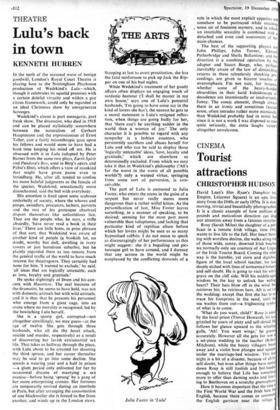THEATRE
Lulu's back in town
KENNETH HURREN
In the teeth of the seasonal wave of benign goodwill, London's Royal Court Theatre is playing host to the Nottingham Playhouse production of Wedekind's Lulu—which, though it celebrates its squalid premises with a certain doleful vivacity and within a gay circus framework, could only be regarded as an ideal Christmas show by unregenerate Scrooges.
Wedekind's circus is part menagerie, part freak show. The dramatist, who died in 1918 and can be placed stylistically somewhere between the naturalism of Gerhart Hauptmann and the expressionism of Ernst Toiler, cast a fairly misanthropic gaze upon his fellows and would seem to have had a hard time keeping his mind off sex. He is obsessed with it in Lulu (adapted by Peter Barnes from the same two plays, Earth Spirit and Pandora's Box, used in Berg's opera and Pabst's film), which offers a view of mankind that might have given pause even to Strindberg. He, after all, tended to confine his more baleful judgments to the female of the species; Wedekind, sensationally more disenchanted, said the hell with everybody.
His attention is fixed upon some scabrous underbelly of society, where the whores and pimps, swindlers, procurers, lechers, perverts and the rest of his grotesque charivari disport themselves like unfastidious lice. They are the people who, he says, a trifle absurdly, 'have never read a book in their lives.' There are little hints, in prim phrases of that sort, that Wedekind was aware of another kind of people (a bookish lot, no doubt, worthy but dull, dwelling in ivory towers or just humdrum suburbs), but he plainly regarded them as too remote from the general traffic of the world to have much interest for theatregoers. They certainly had none for him. 'I wanted to exclude,' he said, `all ideas that are logically untenable, such as love, loyalty and gratitude.'
He spoke slightingly of Ibsen and his con- cern with Haustiere. The real business of the dramatist, he seems to have held, was not with domestic animals but with wild animals; and it is thus that he presents his personnel who emerge from a giant cage, into an arena where no morality is recognised, led by the bewitching Lulu herself.
She is a sporty girl, corrupted—not altogether unwillingly, we may guess—at the age of twelve. She gets through three husbands, who all die (by heart attack, suicide and murder, respectively) as a result of discovering her lavish extramarital sex life. That takes us halfway through the piece, with Lulu about to be arrested for shooting the third spouse, and her career thereafter may be said to go into some decline. She spends a wearing year and a half in prison —a glum period only enlivened for her by occasional dreams of marrying a sex maniac—before being 'sprung' by a gang of her more enterprising cronies. Her fortunes are temporarily revived during an interlude in Paris, but after arranging the assassination of one blackmailer she is forced to flee from another, and winds up in the London stews. Stooping at last to overt prostitution, she has the fatal misfortune to pick up Jack the Rip- per on one of his bad nights.
While Wedekind's treatment of her gaudy affairs often displays an engaging touch of sardonic humour CI shall be master in my own house,' says one of Lulu's potential husbands, 'I'm going to have some say in the kind of lovers she has'), the nearest he gets to a moral statement is Lulu's resigned reflec- tion, when things are going badly for her, that 'there can't be anything sadder in the world than a woman of joy.' The only character it is possible to regard with any sympathy is a lesbian countess, who persistently sacrifices and abases herself for Lulu and who can be said to display those 'logically untenable' ideas, 'love, loyalty and gratitude,' which are elsewhere so determinedly excluded. From which we may take it that in Wedekind's philosophy (`All's for the worst in the worst of all possible worlds'?) only a warped virtue, springing from some sort of perversion, is con- ceivable.
The part of Lulu is entrusted to Julia Foster, who enters the arena in the guise of a serpent but never really seems more dangerous than a rather wilful kitten. As the personification of lust, Miss Foster leaves something, in a manner of speaking, to be desired; seeming for the most part more vulnerable than voluptuous, and lacking that particular kind of reptilian allure before which her lovers might be seen as so many hypnotised rabbits. I do not mean to speak as discouragingly of her performance as this might suggest: she is a beguiling and pic- turesque girl to have around, and I daresay that any actress in the world might be nonplussed by the conflicting demands of a Julia Foster in 'Lulu' role in which the most explicit appetites are somehow to be portrayed while retaining some air of feminine mystery, and in which an insatiable sexuality is combined with a detached and even cool assessment of her main chances.
The best of the supporting players are John Phillips, John Turner, Edward Petherbridge and Sheila Ballantine; and the direction is a combined operation by the adapter and Stuart Burge, who, perhaps inevitably aware -of the law of diminishing returns in these relentlessly shocking pro. ceedings, are given to bizarre touches of overemphasis. I'm not sure, for instance, whether some of the heavy-handed absurdities in their lurid kaleidoscope of decadence are intentionally or inadvertently funny. The comic element, though alway there in an ironic and sometimes farcica sense, often intrudes rather more maniacally than Wedekind probably had in mind; but since it is not a work I was disposed to take quite seriously, the extra laughs weren altogether unwelcome.






































 Previous page
Previous page